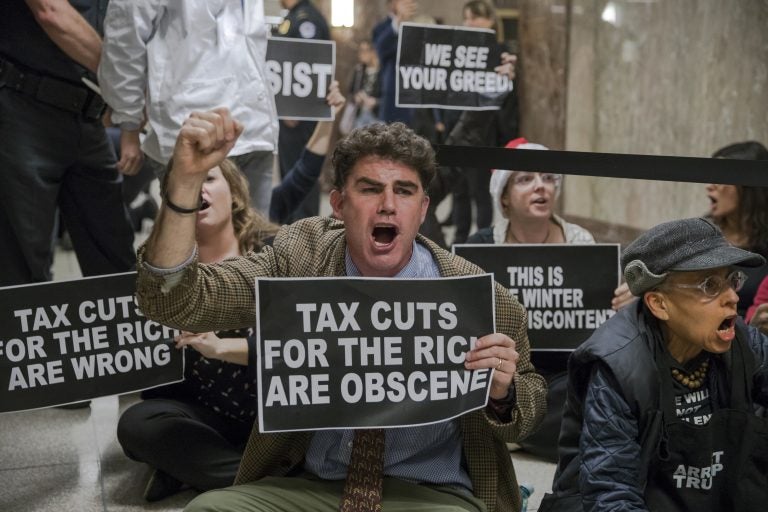Tax bill should unite American middle class across racial lines
The top 1 percent of Americans use racial and ethnic strife to distract us from the one commonality that should unite us — class.
Listen 3:15
Protesters shout their disapproval of the Republican tax bill outside the Senate Budget Committee hearing room on Capitol Hill in Washington, Tuesday, Nov. 28, 2017. (AP Photo/J. Scott Applewhite)
The passage of the Senate tax bill illustrates in stark detail that the American struggle is more about class than race.
Just as European nobles exploited serfs in medieval times, or planters exploited share croppers in the post-Civil War South, the top 1 percent of Americans now exploit the rest of us with the help of compliant politicians.
They do so by using racial and ethnic strife to distract us from the one commonality that should unite us — class.
Thanks to our focus on the racial, religious, and ethnic differences that divide us, too many of us are woefully uninformed about a tax bill that will affect every American — no matter how we look, where we come from, or how we worship. And it will affect us based on class.
According to a recent analysis by the nonpartisan Tax Policy Center, the bill, which passed along party lines with no Democratic votes, will give an $850 tax cut to the average taxpayer earning between $50,000 and $85,000 in 2019. However, the average taxpayer earning over $1 million will get more than $34,000 in tax cuts, and that gap will widen when the individual tax cuts in the bill expire in 2025.
Corporations will do exceedingly well under the bill, which cuts the corporate tax rate from 35 percent to 20 percent. Unlike individual tax cuts, the corporate tax cuts don’t expire.
Rich kids will do well, too. They’ll get up to $11 million passed down to them tax-free.
Unfortunately, about 13 million poor and middle class Americans could lose healthcare under the Senate tax bill, because the bill includes a repeal of Obamacare’s individual mandate, which requires every American to have health insurance or face a penalty.
All told, the Senate tax bill could add $1.4 trillion to the deficit, according to the nonpartisan Congressional Budget Office. But GOP Senators insist that we’ll recoup the money through economic growth.
I don’t believe that. In my view, the Senate tax bill is a giveaway to the rich. The House version might be worse, since it takes away student loan deductions. And when the two bills are combined to form the final legislation that the president will sign, the rich will still get the lion’s share of the benefits. And it’s not like they need it.
According to a recent Federal Reserve report, the top 1 percent of Americans already holds almost 40 percent of the nation’s wealth. That’s a historic high.
And yet, many of us still believe it when Congress and the president say that giving even greater tax benefits to the rich will eventually result in more money for the rest of us. We heard those same claims from those who backed the George W. Bush tax cuts of 2001 and 2003. A recent report found that the claims weren’t true.
“Despite promises from proponents of the tax cuts,” said the October 2017 report from the nonpartisan Center on Budget and Policy Priorities, “evidence suggests that they did not improve economic growth or pay for themselves, but instead ballooned deficits and debt and contributed to a rise in income inequality.”
So rather than bickering over the racial and ethnic differences that the rich have used to divide us, perhaps it’s time for the middle class to come together along economic lines.
Perhaps it’s time to recognize that if we’re not part of the 1 percent, we’re all in the same boat.
—
Listen to Solomon Jones weekdays from 10 a.m. to noon on Praise 107.9 FM.
WHYY is your source for fact-based, in-depth journalism and information. As a nonprofit organization, we rely on financial support from readers like you. Please give today.





